Orphan Soldiers
It’s zero dark thirty, May 17, 1944, three weeks before D-Day. Two British commandos have come ashore on a Normandy beach to survey minefields and map paths up into the French countryside. The mission is as textbook as any covert operation can be, at least until something spooks the German sentries, who start firing blindly into the dark.
The commandos make it back to their dinghy and paddle into the choppy open water of the English Channel, desperately hoping to make their rendezvous point. But it’s too late. In a scene seemingly lifted out of every WWII movie ever made, they are caught in the searchlight of an E-boat, the German navy’s fast attack craft. “Hände hoch, Tommy!,” shouts a Kriegsmarine lieutenant, leveling his submachine gun. For these soldiers, the war is over.
Exciting stuff, this—Allied troops operating in Normandy under the noses of the Wehrmacht and the Waffen SS in the lead-up to the June attack. But there’s more to the story. One of the commandos on this mission, a British officer identified as George Lane, was a Jew. Lane’s real name was Lanyi György, and he was born and raised in Budapest. Before he was transported to a POW cage (his captors never cottoned to the fact that he was a Jew), Lane/György had the surreal experience of being quizzed by the legendary German field marshal Erwin Rommel. In a moment that feels like it comes from some lost fragment of Yiddish folklore, György even managed to confront this emissary of darkness on the annihilation of Europe’s Jews.
Rommel’s reply? “That’s politics.”
Lane was part of a small, secretive unit of Jewish commandos, recruited from the ranks of Jewish refugees who had managed to flee the Nazis and find refuge in Britain. All of them had experienced Nazism at first hand. With a few miraculous exceptions, none of them would ever see their parents or loved ones again. Latter-day Maccabees, they fought the Nazis in almost every major Commonwealth operation of the Second World War. They were among the first onto the beach on D-Day, and they fought all the way to the black heart of Hitler’s Reich and beyond.
It is the largely unknown story of these men, known as X Troop, that Leah Garrett sets out to tell in her book of the same name. And it is a story that she is eminently qualified to tell. A professor at Hunter College, Garrett is the author of Young Lions, a masterful 2015 study of how Jewish authors reinvented the American war novel by bringing Jewish soldiers to the center of the action and transforming them, despite the prevailing antisemitism of the time, into figures of “heroic possibility.”
Garrett has a keen, cinematic eye for the human moment that speaks a much larger truth. And she’s an exceptional writer with a rare gift—no doubt helped by her immersion in classic American accounts of war—for conveying the fear and adrenaline-fueled anarchy of combat. Her account of the D-Day landing, seen through the eyes of her protagonists, is vivid and starkly unsentimental. “France was burning, the sky was gray, men were yelling, sometimes screaming. This was not a good day or a good place to die.” There is no glory here, just the smell of “diesel and brine, gunpowder and death . . . dead men and parts of men were being pitched about by the surf.” It is sometimes hard to look, but Garrett draws us in, and X Troop’s 368 pages move very quickly indeed.
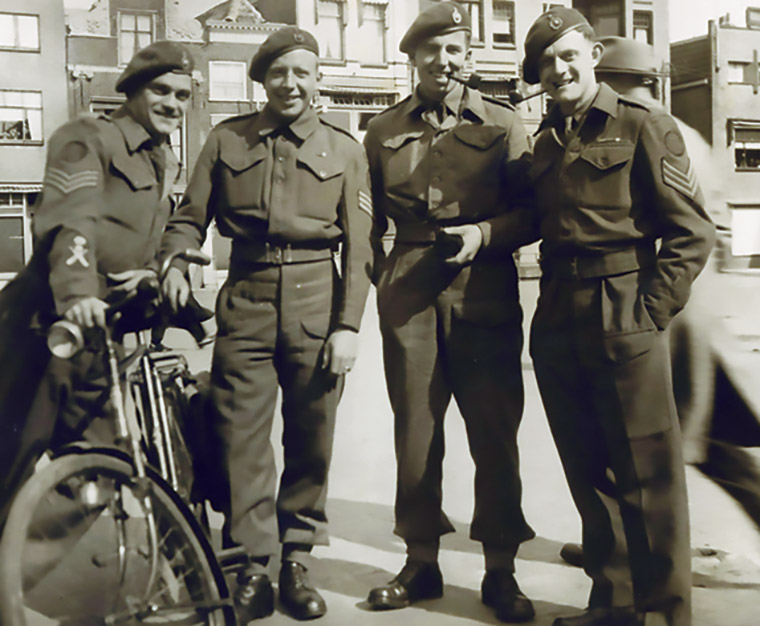
X Troop was the child of brute necessity. In the terrible year of 1941, when the war seemed to be all but lost, Britain knew that its only chance for survival was a willingness to take seemingly impossible risks. Churchill ordered his generals to create tough, highly mobile commando units capable of bringing war directly to the enemy with a minimum of logistical support. Hoping for a day when Allied armies might take the offensive, he knew Britain needed soldiers who could not only fight but also interrogate prisoners in their own language. In doing so, they could produce intelligence to support real-time tactical and strategic decision-making.
And so X Troop—called that because it wasn’t supposed to exist at all—was born, drawing upon the huge number of German-speaking Jewish refugees who had managed to make their way to Britain in the years leading up to the outbreak of war. Ultimately, eighty-seven of these refugees would undergo the arduous commando and intelligence training needed to become X Troopers, and twenty-two of them would be killed in action. They were skilled, loyal soldiers, in large measure motivated by their collective need to avenge the fate of their loved ones, which, even in 1941, was abundantly clear, if only to them.
Years later, the X Troopers’ transformation from refugees to warriors was movingly summarized by veteran Peter Masters (formerly Peter Arany):
First [you were] a hate object. Then if you were lucky and not killed you were a refugee. Then you were, in my case, a farmhand. These were all things I’d never dreamt about being. After that I became a soldier in the Pioneer Corps in the labor unit without weapons. And now comes the [ultimate] transformation like a butterfly out of a cocoon to the elite of the elite. Try and tell me this isn’t a thrilling thing to a young guy.
Masters’s swagger is infectious, as is his pride in taking the battle to an enemy that, for Jews, was entirely existential. But whether as Jews or as refugees, these men were never really wanted by Britain in the first place—Garrett’s excellent book makes this ambivalent relationship abundantly clear.
When war broke out, many of the young men who would become X Troopers were locked up in camps for enemy aliens, often ill-used by their guards and by their fellow prisoners, many of whom were unreconstructed, true-believing Nazis. Others, like Peter Arany, were put to work on farms. Even those who were grudgingly permitted to don a uniform were relegated to home-front labor battalions. It was only when Britain, and indeed, the entire Allied cause, found itself facing the real possibility of annihilation that the potential utility of these men—all of whom had every reason to be highly motivated soldiers—was even considered.
Despite conspicuous heroism in combat, they were largely ineligible for the highest military honors. The memorial erected at their Welsh training base doesn’t even acknowledge the fact that they were Jewish. And despite being more than happy to send them into battle against suicidal odds, Britain refused to naturalize the X Troopers, only doing so—reluctantly—long after the war was over.
This ambivalence extended even to the essential elements of who the X Troopers were. Their commanders, understanding the implications if these Jewish soldiers were captured, instructed each one of them to invent a “British-sounding” name (like Masters) and a backstory to go with it. But as they discovered from their newly issued pay books and dog tags, they were no longer even Jewish: they were now members of the Church of England. Rooted in practicality, perhaps, but a wrenching displacement nonetheless. Orphaned, stateless, nameless, forced to hide their Jewishness, these young men became soldiers whose mission became their identity.
Certainly, the X Troopers had few moral qualms about killing in the heat of battle as they fought their way toward Germany. Some, like Ian Harris, “wanted to kill as many of the bastards” as he could and found sardonic satisfaction in imagining shooting back at some of the same young men who tormented him as a high school student. But in the tradition of Jewish tricksters that extends back to Jacob, they took particular delight in talking entire German units into surrendering without firing a shot. And always, Garrett is finely attuned to the terrible randomness of war. On the morning of D-Day, Peter Masters began to interrogate a couple of POWs. He immediately realized that they were not Germans but a Russian and a Pole in German uniforms. Who were these men, the reader wonders, and how did they end up on the wrong side of history? Are they traitors? True believers? Are they, in fact, a reflection of the X Troopers themselves in a dark and corrupted mirror?
The most affecting part of X Troop is the final third, most of which covers the weeks and months after the German surrender in May 1945. The X Troopers were dispersed across Europe to assist in the long process of hunting down war criminals and “denazifying” of German civil society. And for some, there was the chance—slim, but a chance nonetheless—that some of their relatives might have survived. A few days before the war was even over, Fred Gray (Manfred Gans) set out on a four-hundred-mile journey across Germany to Theresienstadt, in Czechoslovakia.
It is in Garrett’s recounting of Gans’s odyssey that we comprehend the utter devastation wrought by Germany. He moved across the nightmarish landscape of Jahr Null—Year Zero, stalked by “Werewolves” (fanatical Nazis who fought a continuing guerilla war, long after the surrender) and towns full of “angry, frightened Germans . . . a lynch mob atmosphere.” At every turn, Gans encountered starving camp survivors, traumatized refugees, and even a jittery Red Army unit commanded by a Yiddish-speaking officer.
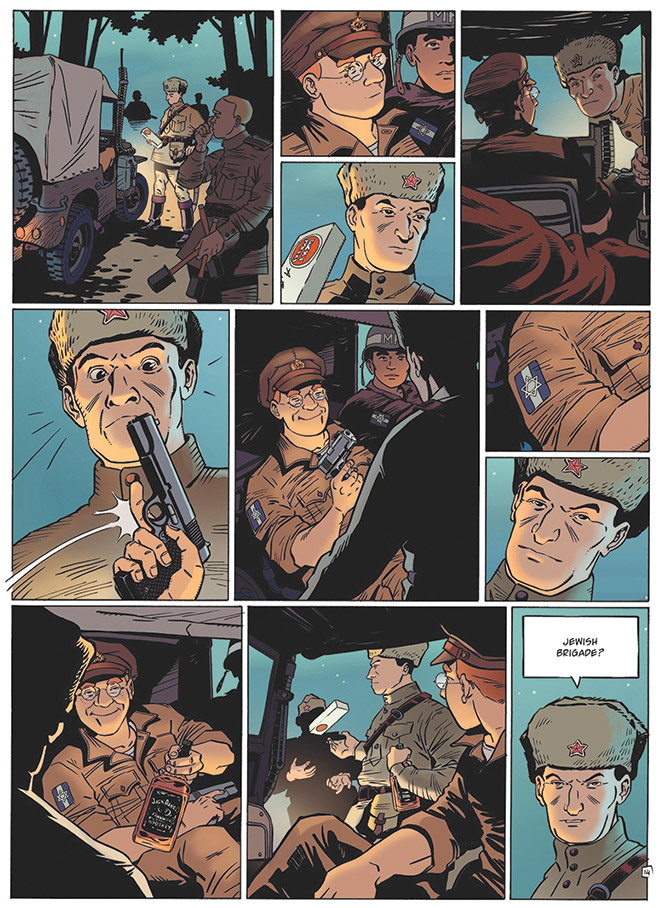
The Belgian comic artist Marvano’s graphic novel, The Jewish Brigade—inspired very loosely by the story of X Troop—is a striking supplement to Garrett’s book. Its brooding earth- and night-toned graphics, its moments of surreal calm followed by horrifying violence, capture perfectly both the ambiguity and the terrible reality evoked by Garrett. In Marvano’s rendition, Gans’s moment with the Soviet patrol is lit by fire, the haunted faces of the Yiddish-speaking officer and his brutalized men, drunk on a toxic brew of rocket fuel and lemonade (Russian soldiers were notorious for drinking almost anything), flickering in and out of focus like background figures in a Brueghel painting. And in an imagined but wholly believable sequence, an emaciated figure in a striped camp uniform appears over a hill, pursued by black-clad civilians on horseback, unaccountably wearing ornate, Napoleonic-era Polish cavalry helmets. The black figures gun the fleeing inmate down and then vanish. Pursuing them, the horrified Jewish soldiers discover a trail of dead Jews, all Mauthausen escapees, leading back for miles into the desolate and empty countryside.
But finally, in what is undoubtedly the most powerful moment in the entire book, Gans arrives at the gates of Theresienstadt. “Ich suche nach Moritz Gans und Else Gans,” he tells a startled inmate still working in the camp records office. And then, they are there, “completely starved and wrecked.” But alive. Gans and his parents collapse into each other’s arms, and another prisoner brings them a celebratory gift: a fragment of carefully preserved Passover matza.
The members of X Troop had every reason to hate the enemy on a deeply visceral level. And as intelligence officers assigned to conduct battlefield interrogations, they had every opportunity to do as they saw fit with their helpless prisoners. But they didn’t. They had no illusions about who they were dealing with—one X Trooper, Fred Jackson (Peter Levy), even found himself interrogating the unrepentant Auschwitz commandant Rudolf Höss; in Levy’s words, “the man who killed my mother.” They relied on language skills, cultural knowledge, and a true intelligence officer’s gift for finding and building upon what is human in even the most repugnant subject. In the years following 9/11, when “enhanced interrogation” became the order of the day, the experience and moral heroism of the X Troopers under the most testing conditions imaginable could have served as a touchstone.
X Troop is a gripping story of Jewish courage and empowerment in the midst of darkness and sorrow—how many Jews fleeing Hitler’s Europe got a chance to return as warriors? It is also a story of displacement and inconceivable loss, of family, of identity, of entire worlds. Finally, it is a story about Jewish choice. Thrust, unusually for their time, into a position of great power, these Jews had to decide how to use that power. Ultimately, they chose wisdom over cruelty. For a contemporary reader, this has remarkable resonance.
Comments
You must log in to comment Log In
Suggested Reading
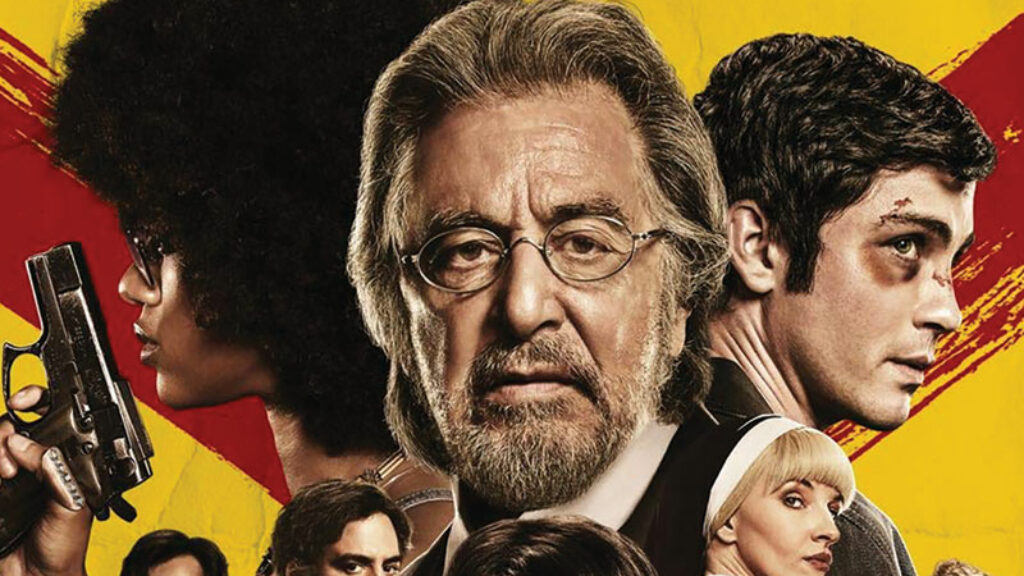
The Best Revenge: A (Qualified) Case for Hunters
“I need an army,” the American Nazi says, “hundreds of ignorant white men looking for someone to blame.”
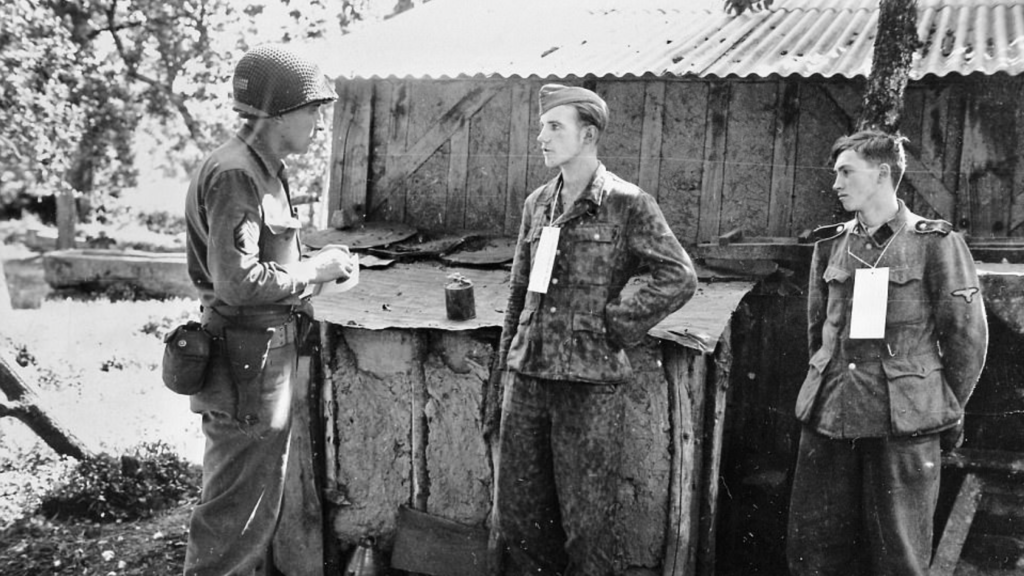
Ritchie’s Boys and the Men from Zion
Our appreciation for stories of Jewish bravery during World War II sometimes obscures the fact that as a group Jews were powerless, reduced to begging others for a chance to bear arms.
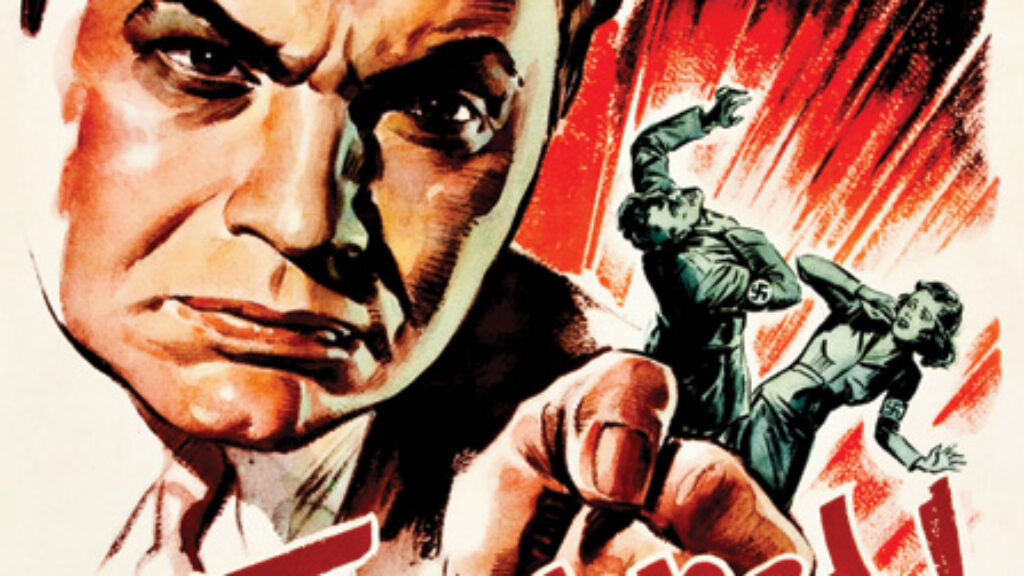
Hollywood’s Anti-Nazi Spies
In 1934, Hollywood's Jewish moguls met secretly at the Hillcrest Country Club to hear an unusual pitch: find Nazis in America, and stop them.
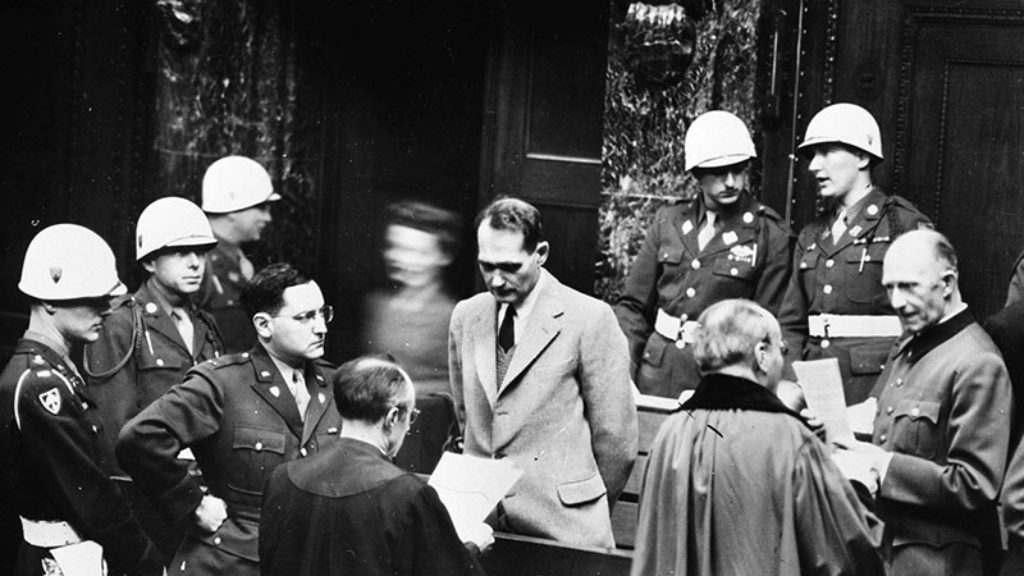
Psychology at Nuremberg
Both Kelley and Gilbert believed they could make a broad psychosocial argument despite the limited sample size, inconclusive tests, infighting, and lack of clear standards and definitions.
Peter Collins
Angus,
An excellent review, as always.
Another interesting book, regarding the plight of Jewish refugee combatants, was authored by John Sadler in 2016. Operation Agreement: Jewish Commandos and the Raid on Tobruk. London: Osprey Publishing. (ISBN 978-1-4728-1488-3).
Warmest regards,
LCdr (retired) Peter Collins, CD - Royal Canadian Navy (Reserve)